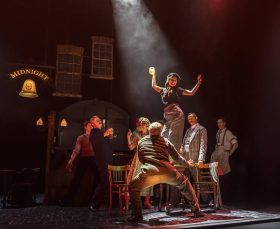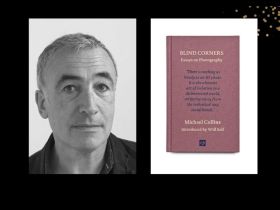Nick Hennegan set up Maverick Theatre in Birmingham in 1994 with composer Robb Williams. The company went from strength to strength, offering theatre in pubs and on estates – and persuading names such as Sir Derek Jacobi to work with them. After a six-year break, Maverick relaunches in September with a tour of Henry V – Lion of England, which Nick wrote, directed and co- produced. He is also planning a move to London to become Resident Director at Shakespeare’s Globe for Rutgers University for eight months. Angela Meredith finds out how he still finds time to present the breakfast show on radio and watch Neighbours.
How did you begin your career in theatre?
As a 12-year-old, I was in a scout Gang Show which ran for a week every Christmas at the Birmingham Hippodrome – one of Britain’s biggest venues. The show was produced and directed by award-winning professionals from ITV and was spectacular – great fun for a shy, working class kid. Years later, I operated lights in amateur theatre. The move to professional theatre was driven by a desire to raise standards.
What exactly does a producer do?
Everything. The producer finds the play, the venue, the creative and technical teams, the publicity – and the money. He sets the tone of the production and rehearsals. He’s also there to be moaned at! But if the producer does a good job, no one should notice him!
How does a producer get paid?
In my case, poorly! After all the above has been sorted and paid for, the producer will get anything that’s left. Including the debts!
What personal skills and attributes does a producer need?
I always worry that I’m not a good producer because I don’t have a good formal education and I’m not motivated by money. So what else is there? In my case, a desire to make great work that will enhance people’s lives, which good theatre really can do. Generally though, people skills are crucial – and an ability to filter out doubters. Also, a degree of courage: Shakespeare gave Henry V the words – Upon The King…!
What is a typical day for you pre-production and during a production?
Pre-production is fairly frantic. I’m at my desk at 10am and usually work through till 10pm, with a break for Neighbours at lunchtime and the Six O’Clock News in the evening. Then I go sit in a quiet pub with a laptop till they throw me out, followed by a take-away curry and home.
During a production, there is little to do apart from worry about the box office and maybe tweak the marketing. Once the first night is over, if you’ve not got it right by then, it’s probably too late! Apart from the odd meeting, it’s generally a solitary job – particularly working in the provinces – so I like to spend time at the venue during productions. Plus I like actors and I tend to work closely with most directors on the feel of a production. I’m fairly hands on and we all have a pint at the end of the night.
Does touring alter the producer’s role?
I’ll let you know when my new tour Henry V – Lion of England finishes next March! But the touring I’ve done so far has not altered the role much, except each venue has more marketing, promotion and sales. The secret – I think – is a good company manager. Fortunately, we have one!
What does the term ‘small-scale’ mean exactly?
The Arts Council has set the number of seats to define small, medium and large-scale venues. I think in England small-scale is up to about 350 seats. But there’s really no such thing as a small-scale producer. The job of producer is fundamentally the same, regardless of scale.
What do you have to consider when choosing a play for production – is it all down to money?
It plays some part. Having said that, most of the work Maverick did at the Billesley pub was subsidised by me and the artists involved because they believed in the concept. I was once offered a Birmingham musical, but we couldn’t afford the orchestra and a large-scale venue produced it. We have produced contemporary classics, but I wanted to produce theatre for people like me, whose roots were poor, white, working class. To do that I knew I had to take theatre out of theatres and demystify the process. We worked in a pub on the edge of a big estate in Birmingham and approached each production as an event. It worked very well in attracting non-theatregoers and we turned down most approaches by conventional theatres to take our work into their formal spaces.
Maverick has been dark since 2001 and is due to recommence operations this year – what have you been up to?
Earning money. We launched Maverick in 1994 and in our second year over 60 per cent of our audiences were first timers. But by 2001, we were attracting more conventional audiences – that and the crippling economics meant it was time to think again.
I went back to radio and still present a breakfast show from 8am to10am every morning on a DAB digital rock station called The Arrow. I also wrote another play and was commissioned to write a short story and I’m working on a book.
How does a company like Maverick secure funding?
With great difficulty. In the early days, we didn’t fit into any of the funding models, so it was largely subsidised by the people who worked for the company. That’s not a good or healthy way to work and I hope the new Maverick will be different. I sound like a politician!
You’ve worked with actors of the calibre of Sir Derek Jacobi. How do you approach the great and good to persuade them to work with Maverick?
In the case of Sir Derek, I seem to remember ranting at a London party about how I wanted a voice, not a physical body, for my forthcoming Ghost of Old Hamlet – and the voice I wanted was Sir Derek’s. I think this got back to him and he said yes – mainly because he likes what we’re trying to do in terms of accessible theatre. He is also a brilliant talent and directing him for the short time I did nearly ruined me! Kenneth Branagh, Campbell Askew and John Adams are also brilliant talents who seem to have warmed to what we are trying to do. It can be a brutal business, but I still believe there are some very beautiful people in it – I’m grateful to every single person who has worked for Maverick, at whatever level.
Why should we bother to go to see Shakespeare in a pub theatre when there’s all that mead to get through?
Precisely because there is all that mead to get through! Shakey without mead? Pointless! And in our case we chose pubs as a venue – it was not because of lack of performing space, as is sometimes the case in London.
Have you always had a clear idea about how your career as a producer would develop?
I wish! Since I was sixteen I’ve been asking myself what do I REALLY want to do. I’m just realising I might be able to have a career, if I’m careful!
If you had a limitless budget, what would you produce, where and whom would you cast?
I had the rights for Journey’s End before it became a big West End hit again. I really wanted to mount it outside in a field in November – too expensive, then. However, if anyone reading this knows of a willing investor…
Also, keep your eyes peeled for a production about Tony Hancock coming to a theatre near you next year – possibly starring a surprising choice of lead actor!
What else have you done in the theatre – or what else are you up to now?
I’ve acted a little, made a short film and produced a feature – and I’ve directed. I also wrote a few plays for Maverick. One of those plays in particular, PALS, was a great hit and will tour nationally once the finance is in place.
I’m also about to move to London for the first time, which I’m very excited about – I’m in line to become Resident Director at Shakespeare’s Globe for Rutgers University for eight months. I love Birmingham, but I also love theatre and its heart is in London. I’m still like a wide-eyed kid whenever I go to the capital and I’m a committed theatre anorak – a heady combination!
What do you love about producing and what do you hate?
I love building a team and see it working well. I also love sitting anonymously in the auditorium on the first night and watching the audience. I took a production to Manchester’s Tameside Hippodrome a few years ago – it’s a 1200-plus seater and I nearly managed to sell out. I couldn’t believe it was my team on that massive stage, giving it their all! All the money we made in Manchester we lost the next week in Swindon, but it was an exhilarating and almost spiritual experience.
I hate the fact that some people think you are trying to rip them off – usually because they have no idea what is involved in mounting a production. And it’s so much harder to produce on the small scale – you are constantly having to beg and borrow.
What’s the worst thing that could possibly go wrong for a producer?
Cancelling a production.
Any funny stories?
The look on the young student barman’s face when our stage manager told him I had written, directed and co-produced Henry V – Lion of England. He thought I was a stagehand. The really funny stories will be appearing in a book soon!
Harvey Goldsmith or Syd Golder? Choose one for your next incarnation on earth and state reasons.
Harvey Golder – it’s my current incarnation, although I’ve not fully realised it yet. I don’t see why fringe and mainstream theatre should be separated like it is, though. I have plans to change that and am looking for the right producing partners. I’d like to create a London-wide theatre piece. Although London is much bigger, I am convinced the principles we applied to our work in Birmingham would work in the capital just as well.




